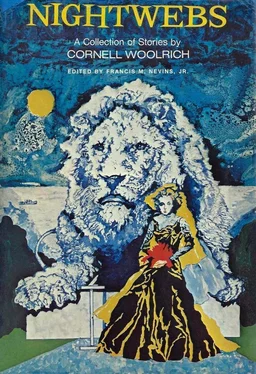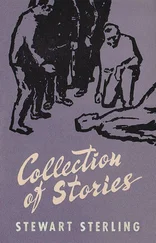“Who are they?” she wanted to know.
“As long as I don’t tell you, you’ve still got a chance. I’m not dooming you if I can help it!”
She didn’t press the point, almost — it occurred to me later — almost as though she already knew all there was to know. “I’ll call the station, find out when the next one leaves—”
I heard her go out in the hall, jiggle the phone-hook for a connection. I squatted down, stuck the pearls back in the case for her. I raised my eyes, and her feet were there on the carpet before me again.
She didn’t whimper and she didn’t break; just looked through me and beyond as I straightened up. “They mean business,” she breathed. “The phone’s gone dead.”
She moved back to the window, stood there looking out. “There’s a man been standing across the way reading a newspaper the whole time we’ve been talking in here. He seems to be waiting for a bus, but three have gone by and he’s still there. We’ll never make it.” Then suddenly her face brightened. “Wait, I have it!” But her enthusiasm seemed spurious, premeditated, to me. “Instead of leaving here together to try to get through to the station, suppose we separate — and meet later on the train. I think that’s safer.”
“What! Leave you behind alone in this place? Nothing doing.
“I’ll go first, without taking anything with me, just as though I were going shopping. I won’t go near the station. I can take an ordinary city-bus to Hamlin, that’s the first train-stop on the way to New York. You give me a head-start, show yourself plentifully at the window in case he’s one of their plants, then slip out the back way, get your ticket and get aboard. I’ll be waiting for you on the station-platform at Hamlin, you can whisk me aboard with you; they only stop there a minute.”
The way she told it, it sounded reasonable, I would be running most of the risk, getting from here to the station. I agreed. “Stay in the thick of the crowd the whole way,” I warned her. “Don’t take any chances. If anyone so much as looks at you cross-eyed, holler blue murder, pull down the whole police force on top of them.”
“I’ll handle it,” she said competently. She came close, our lips met briefly. Her eyes misted over. “Bud darling,” she murmured low, “a long life and happy one to you!” Before it had dawned on me what a strange thing to say that was, she had flitted out and the door had closed after her.
I watched narrowly from the window, ready to dash out if the man with the paper so much as made a move toward her. To get the downtown bus she had to cross to where he was and wait beside him. He took no notice of her, never raised his eyes from his paper — a paper whose pages he hadn’t turned in a full ten minutes. She stood there facing one way, he the other. They could, of course, have exchanged remarks without my being aware of it. The bus flashed by and I tensed. A minute later I relaxed again. She was gone; he was still there reading that never-ending paper.
I decided to give her a half-hour’s start. That way, the train being faster than the bus, we’d both get to Hamlin about simultaneously. I didn’t want her to have to wait there alone on the station-platform too long if it could be avoided. Meanwhile I kept returning to the window, to let the watcher see that I was still about the premises. I — Joan too for that matter — had long ago decided that he was a lookout, a plant, and then about twenty minutes after she’d gone, my whole theory collapsed like a house of cards. A girl, whom he must have been waiting for the whole time, came hurrying up to him and I could see her making excuses. He flung down his paper, looked at his wristwatch, took her roughly by the arm and they stalked off, arguing violently.
My relief was only momentary. The cut phone-wires, my crippled car, were evidence enough that unseen eyes had been, and still were watching me the whole time. Only they did it more skillfully than by means of a blatant look-out on a street corner. At least with him I had thought I knew where I was at; now I was in the dark again.
Thirty-five minutes after Joan had gone I slipped out through the back door, leaving my car still out there in front (as if that would do any good), leaving my hat perched on the top of an easy-chair with its back toward the window (as if that would, either). I followed the service-alley between the houses until I’d come out on the nearest sidestreet, around the corner from Joan’s. It was now one in the afternoon. There wasn’t a soul in sight at the moment, in this quiet residential district, and it seemed humanly impossible that I had been sighted.
I followed a circuitous zig-zag route, down one street, across another, in the general direction of the station, taking time out at frequent intervals to scan my surroundings with the help of some polished show-case that reflected them like a mirror. For all the signs of danger that I could notice, the Friends of Death seemed very far-away, non-existent.
I slipped into the station finally through the baggage entrance on the side, and worked my way from there toward the front, keeping my eyes open as I neared the ticket-windows. The place was a beehive of activity as usual, which made it both safer and at the same time more dangerous for me. I was safer from sudden seizure with all these people around me, but it was harder to tell whether I was being watched or not.
“Two to New York,” I said guardedly to the agent. And pocketing the tickets with a wary look around me, “When’s the next one leave?”
“Half-an-hour.”
I spent the time by keeping on the move. I didn’t like the looks of the waiting-room; there were too many in it. I finally decided a telephone-booth would be the likeliest bet. Its gloom would offer me a measure of concealment, and instead of having four directions to watch at once, I’d only have one. Then, too, they were located conveniently near to the gates leading outside to the tracks. Passengers, however, were not being allowed through the latter yet.
I took a last comprehensive look around, then went straight at a booth as though I had a call to make. The two on each side of it were definitely empty; I saw that as I stepped in. I gave the bulb over me a couple of turns so it wouldn’t flash on, left the slide open on a crack so I could catch the starter’s announcement when it came, and leaned back watchfully against the far partition, eyes on the glass in front of me.
Twenty minutes went by and nothing happened. An amplifier suddenly came to life outside, and the starter’s voice thundered through it. “New York Express. Track Four. Leaving in ten minutes. First stop Hamlin—”
And then, with a shock like high-voltage coursing through me, the phone beside me started pealing thinly.
I just stood there and stared at it, blood draining from my face. A call to a tollbooth? It must, it must be a wrong number, somebody wanted the Information Booth or—! It must have been audible outside, with all I had the slide partly closed. One of the redcaps passing by turned, looked over, then started coming across toward where I was. To get rid of him I picked up the receiver, put it to my ear.
“You’d better come out now, time’s up,” a flat, deadly voice said. “They’re calling your train, but you’re not getting on that one — or any other.”
“Wh — where are talking from?”
“The next booth to yours,” the voice jeered. “You forgot the glass inserts only reach halfway down.”
The connection broke and a man’s looming figure was shadowing the glass in front of my eyes, before I could even get the receiver back on the hook. I dropped it full-length, tensed my right arm to pound it through his face as soon as I shoved the glass aside. He had a revolver-bore for a top vest-button, trained on me. Two more had shown up behind him, from which direction I hadn’t noticed. It was very dark in the booth now, their collective silhouettes shut out all the daylight. The station and all its friendly bustle was blotted out, had receded into the far background, a thousand miles away for all the help it could give me. I slapped the glass wearily aside, came slowly out.
Читать дальше












